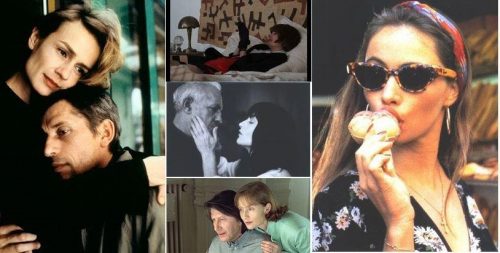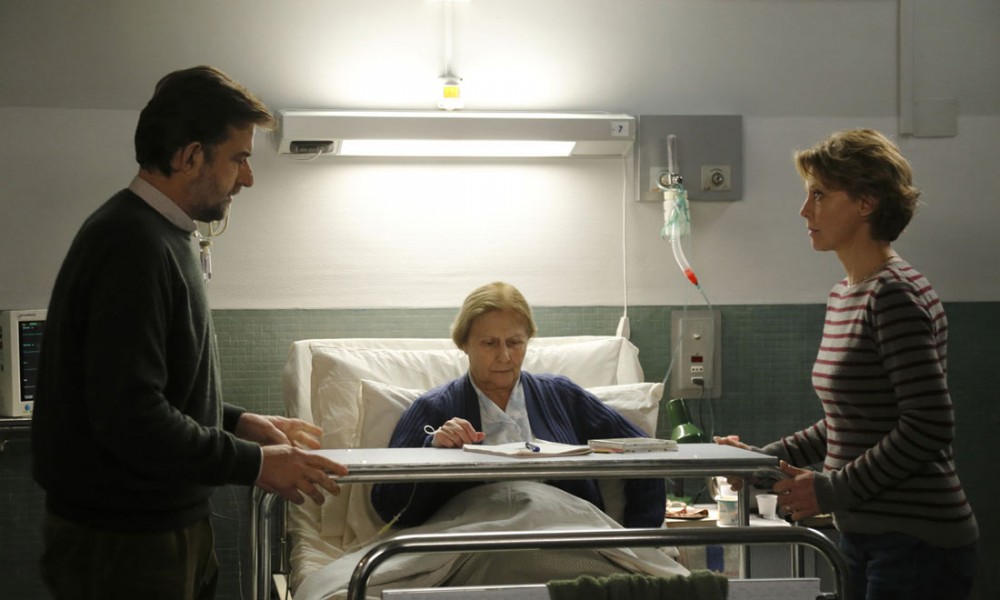The Claude Chabrol Series: Five Slices of a Psyche, by Alexander Miller
Although he’s a championed director of nouvelle vague, he’s bound to be the overlooked middle child behind frontrunning figures whose legacies soldier on unchallenged, but it can be frustrating for Claude Chabrol fans. The payoff for champions of his work is his massive body of films. The Cohen Film Collection has gathered five works made between 1992 and 2000 for a weeklong retrospective – starting Friday – at Laemmle’s Royal Theatre in West L.A.
I.) Betty (1992)
An icy examination of an emotionally-fractured titular character a lone alcoholic who develops a close bond when she meets a middle-aged couple Laure and Mario, the first an audience for Betty’s tragic backstory and the later a proprietor of a small bar with an eclectic clientele.
Whenever you enter a Chabrol film, the first act is fraught with questions, “who is Betty, why is she alone, who, or what has broken this women”? And in the tradition of the director’s method of storytelling we eventually find our questions answered as Betty’s backstory is peeled back layer by layer. Betty is in the tradition of Chabrol’s reserved thrillers with its removed locale and veil of mystery, but this is in some ways a departure from his mysteries, turning his lens to a more downbeat look at self-destructive, advantageous behavior. A bit more misanthropic regarding Chabrol’s objective purview, Betty is compelling throughout thanks to cleverly-staged intervals of narrative presentation shaping an oblique character study. Stephane Audran is solid as Laure, but Marie Trintignant lends a commanding and rightfully show-stealing performance in the title role, with vulnerability matched by a cunning stature.
II.) The Colour of Lies (1999)
“Provincial Thrillers” seems like the default term to describe Chabrol’s methodical approach to genre films, and it’s entirely appropriate as his settings are always lived-in hamlets on the outskirts of France, away from the iconic familiarity of the streets of Paris. The very title evokes a consistent recurring element in Chabrol’s work, and that is the distillation of the truth, lies, and human nature. The setup is simple, a story that we’d see on a crime procedural is in the hands of a master, and his elaboration is just as intriguing and revealing as anything from his golden period of filmmaking.
A ten-year-old girl is found dead on the outskirts of a coastal hamlet of Brittany. The last person to have seen her alive is René, who teaches an art class to the local children. A troubled artist and outcast (played almost too well by Jacques Gamblin), he is the perfect suspect in the eyes of the police. The murder, however, is almost peripheral, giving way to a colorful panorama of narrative splinters. What might seem like diversionary sidesteps, red herrings, or quirky characterizations are all part of a detailed groundwork. Chabrol’s cinema is rooted in genre, but he’s also a stylist in terms postmodernist appeal; the idea of the “person you least suspect” being the killer is silly, and dramatic reveals are saccharine. Chabrol transforms the genre (in a manner of speaking) by exceeding modernist expectation; there’s more than one twist, and it can expound beyond filmic boundaries – the “Chabrolian twist” is consistent enough to have become a slang term but never reduces itself into banality. This delicately enthralling look at the flexibility of the truth, (or The Color of Lies perhaps?) is riveting by adhering to a proven structure, but laying some new bricks along the way.
Chabrol doesn’t build worlds, but small towns, villages, and hamlets with a population of idiosyncratic locals; some grotesque, others funny, many strange. The lived-in quality of these off-radar locales make the perfectly unlikely habitat for a murder mystery. There’s an elemental accentuation to the locale. Brittany is quite, breezy, raining, foggy, little town with big secrets. There’s a storm on the horizon, but, like the killer’s identity, will it ever materialize?
III.) Nightcap or Merci Pour le Chocolat (2000)
Billed here as Nightcap, I was introduced to this slice of domestic intrigue as Merci pour le chocolat, but regardless of the title this is another treat in the director’s trove of delectable thrillers. It was discarded by some as being “more of the same”, and in some respects that is true, but when you’re this good it’s okay to repeat yourself. And what seems repetitive upon initial release becomes consistent in retrospect.
When Jeanne (Anna Mouglalis) and her family read that concert pianist Andre Polonsky (Jacques Dutronc) is getting remarried to Swiss chocolate heiress Mika (Isabelle Huppert), she is regaled with a curious story about some confusion that occurred when she was born, realizing that there’s a good chance she could be an estranged daughter of Polonsky. Once Jeanne confronts Polonsky with this news it spurns a rift among the well-to-do family. While some question the validity of her claim, Andre seems to bond with her, given their shared passion as musicians.
Adapted from a novel by Charlotte Armstrong entitled The Chocolate Cobweb, this low-key narrative has the ingredients of a soapy melodrama but in Chabrol’s ever cool, calm, and collected hands, Nightcap gives us more to ponder, feeding our imaginations with even more to mull over while we wait for the mystery to come full circle.
It goes to show that a little restraint can go a long way, as this thriller would likely crumble in lesser hands as a limping whodunnit. Chabrol’s self-diffusing direction is content to let us boil over the details while dramatic intonation reveals itself in its own measured course. Nightcap isn’t his best, but it’s not a dud either. One of its strongest cards is Huppert, who is in fine form as the duplicitous Mika, not exactly a femme fatale but icy, calculating, and yet she assimilates so well with their blasé, bourgeois decor enabling her nefarious deeds without raising an eyebrow. While some have reacted to the finale as underwhelming, Nightcap has a more emotional reveal, and anyone familiar with Chabrol’s work won’t find that as a damper.
IV.) The Swindle – Small Time Crooks (1997)
Claude Chabrol had many great qualities and in the wake of his driving momentum, he always seemed to do right by the multiple genres and subgenres he explored. Most of his best work are under the thriller/mystery margins, proving he’s more than capable handling everything in between, and The Swindle is evidence of his ability to craft an exciting and light-hearted heist film.
The first few minutes in The Swindle boast some brilliant visual storytelling. After a playful opening credits scene in a casino, we see Isabelle Huppert lure a doltish bacharach player up to his room while a sharp older gentleman intently follows. Once she slips something in his drink we know he’s a mark, and while he dozes off Huppert is joined by her dapper shadow. Victor and Betty are old hands at this. Once their target is unconscious, they take just what they need – never too much, just enough to make it worthwhile without drawing too much attention. Betty and Victor have just done something we rarely see in movies; the perfect crime. It’s swift, smart, and subtle, and they seem like good team who are good at what they do. But if everything is going swell where’s the fun in that?
There’s a flattering veneer to The Swindle. It’s clean, smooth – veering on sterile – but that’s the genre, let’s face it. Would you buy a bunch of bums robbing a casino in the Oceans series, or Alain Delon wearing overalls in Le cercle rouge? Postmodern instincts come so naturally in Chabrol’s work it goes one step past a wink and a nudge to rearranging cinematic vernacular. The Swindle is smart in its temperament, style, and humor without being cute or self-satisfied.
V.) L’enfer (Hell or Torment) (1994)
L’enfer is a departure from Chabrol’s more literal mysteries in that it delves into a more psychological territory, which doesn’t come as a surprise seeing as it’s the brainchild of H.G. Clouzot (director of the nail-biting suspense film Les Diaboliques). But Chabrol, another descendant of the Hitchcockian school of thought, would naturally gravitate toward this material. Once you have a hybrid type film you can’t help but wonder how the director will treat the material as it’s penned by another respected filmmaker. Will there be a clash in their contrasting but similar styles? Will Chabrol try to pay homage to Clouzot by adopting his directorial mannerisms? And with such a cryptic, broad title (literally translates to “Hell”) derived from an unfinished film from one of French cinema’s masterclass one has wonder, what the hell is Hell about?
The opening gives us a look into the lives of the characters, a sort montage of “life expedited” as we see Paul meet Nelly, fall in love, get married, have kids, and run a modest and friendly inn. We gather that this handsome couple is doing well for themselves. Life is perfect, and of course perhaps a little too perfect. Underneath beneath Paul’s shrimpy demeanor is an obsessive fixation on his wife’s fidelity. Any form of body language is interpreted as being flirtatious. Every time Nelly is out of eyesight, Paul’s convinced she’s with another man.
For a portion, there’s enough gray area for us to entertain the idea that Paul’s not just a paranoid drip, but his neuroses wear down until he’s a seething maniac, succeeding only in humiliating himself and his poor wife Nelly at any and every opportunity. The setting and tone of L’enfer feel familiar to the director’s modus operandi, but the insular psychology is a leap in an another direction, as we were warned this is clearly the influence of the original concept. While referential authority was an initial concern going into L’enfer, the film remained faithful to Chabrol’s tonal consistency.
L’enfer is a compelling turn for Chabrol, and Paul’s downward spiral is persuasive thanks to Francois Cluzet’s nervy performance. Emmanuelle Beart will stand out to American viewers as the IMF agent Claire Phelps in Brian De Palma’s Mission: Impossible, perfect here as the ambiguously flirtatious Nelly.
L’enfer is at times hard to watch after Paul’s outbursts become more and more unsettling. However, that is the point of the film. Aside from a questionable intonation at the final credits, L’enfer is an unlikely potent melodrama.



























